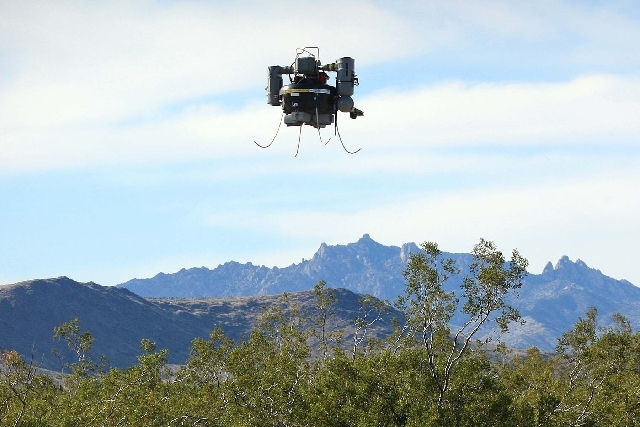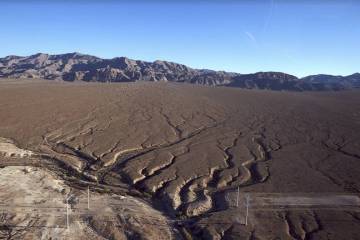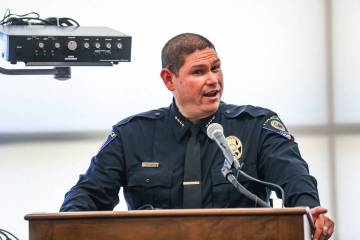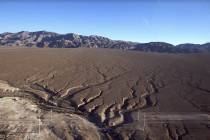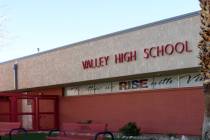UNLV targets creation of drones technology minor
Creech Air Force Base drone crews operate unmanned aircraft in war zones from their Indian Springs location.
The U.S. Geological Survey plans to use less sophisticated drones to spy on Southern Nevada’s mule deer and bighorn sheep later this year.
The expanding use of unmanned aerial vehicles in both military and civilian life has UNLV considering the creation of a drones minor program for students, said Thomas Piechota, the university’s interim vice president for research and dean of the graduate college.
The minor program focusing on the science behind drones and their uses would complement degrees in fields such as mechanical, electrical and aerospace engineering. In looking at whether to offer the drones minor, University of Nevada, Las Vegas officials now are gathering information on industry needs.
“That’s what we are trying to evaluate,” Piechota said last week. “We have faculty and students doing work with unmanned aerial vehicles already.”
The program would bolster statewide efforts to bring government, industry and education together. The Nevada Governor’s Office of Economic Development in May submitted the last part of an application to the Federal Aviation Administration seeking to become one of six states designated as testing and training sites for unmanned aerial vehicles.
“Nevada is well positioned,” Piechota said.
The state is competitive for various reasons, including a strong military presence, clear and open testing ranges, the climate and education programs that are already in place to support the industry, Piechota said.
The education programs exist at the K-12, community college and four-year university levels. For example, Piechota said, Rancho High School offers an Academy of Aviation magnet program.
“If the state gets designated, I think there’s certainly going to be a demand,” he said.
Doug van Aman, regional director with the Nevada Governor’s Office of Economic Development, said Nevada has a high chance of getting selected as one of the six sites because of its long history with unmanned aerial vehicles.
“We were one of the first states, if not the first, to have UAVs in a test scenario,” he said. “We have a history of it and it’s kind of in our DNA now.”
If the FAA selects Nevada, it would help build a new industry in the state. It would help expand existing companies and would help attract new ones into the state, Aman said. “It’s an opportunity to be the Silicon Valley of the UAV industry.”
The state should get a response from the FAA by the end of this year.
Last week, UNLV officials met with various industry leaders.
“We wanted to hear from them, what are their workforce needs,” he said.
University officials are still also trying to see how they can incorporate a specialty minor program into the existing programs. Also, not many students are going into science, technology, engineering and mathematics fields, often referred to as STEM, but a minor centered on drones could help attract students who might not otherwise be interested in those fields, Piechota said.
Bill Culbreth, associate professor of mechanical engineering at UNLV, has done research on unmanned aerial vehicles, including testing on a heavy fuel diesel engine. Many graduate students have worked with him on the research.
“They are really fun. They really attract the students,” he said of such research projects. “A minor would be a way to attract undergraduate students. I think there would be plenty of students who would be interested in going into that minor.”
But industry support would be critical in developing the program.
“We need to work closely with the industry to make this happen,” Piechota said.
Budget limitations are also something university officials have to keep in mind. A minor program wouldn’t be costly, but it would require additional financial support, Piechota said. The exact cost has yet to be determined.
“We would want to hire new faculty that would be able to support a program like this and grow a program like this,” he said.
Culbreth said UNLV already offers related courses that could support the drones minor, such as classes offered by the College of Engineering.
“There’s quite a few courses that could be used for that minor,” he said.
If the program is ultimately created, students who pursue the drones minor might have an easier time landing a job after graduating, a good paying job.
During the first quarter of this year, there were more than 13,500 filled aerospace and defense jobs statewide, Aman said. The average annual salary for those jobs is in the range of $80,000.
“We do have a good solid foundation for building a workforce,” he said.
Contact Reporter Yesenia Amaro at yamaro@reviewjournal.com or 702-383-0440.



